|
|
|
Sort Order |
|
|
|
Items / Page
|
|
|
|
|
|
|
| Srl | Item |
| 1 |
ID:
189519
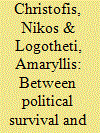

|
|
|
|
|
| Summary/Abstract |
Cyprus has featured prominently on Turkey’s foreign policy agenda in recent years. The ruling Justice and Development Party (AKP) has weaved this long-standing issue into a broader narrative of ‘geographical imagination’. Cyprus policy has thus reflected the AKP’s socio-political vision of a ‘Yeni Türkiye’ (New Turkey), first articulated nearly a decade ago, in which well-entrenched narratives about national identity and the Cyprus conflict are central. Against this backdrop, Cyprus has been leveraged in the twin interests of AKP survival (boosting incumbency through nationalist appeals) and Turkey’s regional power aspirations. The present article offers a timely survey of Turkey’s Cyprus policy over a 15-year period from 2002 (when the AKP rose to power) until the failure of the negotiation talks on Cyprus in Crans-Montana, Switzerland in July 2017. In so doing, the article charts the important continuities as well as the key markers of transition in Ankara’s policy towards Cyprus under the AKP.
|
|
|
|
|
|
|
|
|
|
|
|
|
|
|
|
| 2 |
ID:
106925
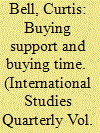

|
|
|
|
|
| Publication |
2011.
|
| Summary/Abstract |
History provides many examples of benevolent dictators who become increasingly repressive and new democracies that take years to improve public welfare. I account for this temporal variation in public goods provision by considering how regime consolidation changes leaders' incentives to provide public goods. To stay in office, all leaders must maintain a sufficient level of support from those possessing the power to replace the leader via institutional processes. Leaders of unconsolidated regimes face additional threats posed by viable extra-institutional challengers, such as coup plotters and revolutionaries. Tests on public goods spanning political freedoms, government expenditures, education, and health generally suggest leaders' incentives for public goods provision change as regime consolidation insulates leaders from these extra-institutional threats to power. Regimes with inclusive institutions spend more on public goods as they consolidate and become less vulnerable to elite demands. Exclusive regimes spend more on public goods when they are vulnerable to the excluded masses, but become increasingly repressive as they become insulated from popular uprisings. Consequently, consolidation magnifies the positive effect of democracy on public goods provision. These findings have important implications for the literatures on public goods provision and regime survival.
|
|
|
|
|
|
|
|
|
|
|
|
|
|
|
|
| 3 |
ID:
151151


|
|
|
|
|
| Summary/Abstract |
Despite the prevalence of nonviolent uprisings in recent history, no existing scholarship has produced a generalized explanation of when and where such uprisings are most likely to occur. Our primary aim in this article is to evaluate whether different available models—namely, grievance approaches, modernization theory, resource mobilization theory, and political opportunity approaches—are useful in explaining the onset of major nonviolent uprisings. We assemble a reduced list of correlates based on each model and use each model’s out-of-sample area under the curve and logarithmic score to test each theory’s explanatory power. We find that the political opportunity model performs best for both in- and out-of-sample cases, though grievance and resource mobilization approaches also provide some explanatory power. We use a culled model of the predicted probabilities of the strongest-performing variables from all models to forecast major nonviolent uprisings in 2011 and 2012. In this out-of-sample test, all models produce mixed results, suggesting greater emphasis on agency over structure in explaining these episodes.
|
|
|
|
|
|
|
|
|
|
|
|
|
|
|
|
| 4 |
ID:
154740
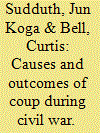

|
|
|
|
|
| Summary/Abstract |
Though approximately one in four coup attempts takes place during an ongoing civil war, scholars have not yet analyzed how the incidence of civil war affects coup attempts and outcomes. We conduct the first empirical analysis of the relationship between ongoing civil war and coup activity, finding (1) war increases the risk of a coup attempt, though (2) war-time coup attempts are significantly less likely to be successful, and (3) the risk of war-time coup is much higher when states face stronger rebel groups that pose greater threats to the political survival of the incumbent government. We attribute these findings to the pernicious effect of ongoing war on the welfare of the military elites and soldiers who have the greatest capacity to execute a coup attempt. As war diminishes their welfare and creates uncertainty about the future of the state, potential plotters become more willing to accept riskier coup attempts than they might plot during peace-time. Coup motivations are greatest when incumbents are more likely to lose their wars, and this causes coup plotters to attempt more and riskier coups when rebels are relatively strong.
|
|
|
|
|
|
|
|
|
|
|
|
|
|
|
|
| 5 |
ID:
093683
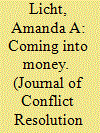

|
|
|
|
|
| Publication |
2010.
|
| Summary/Abstract |
Donors are more likely to send aid to leaders facing elevated risks of losing power, but targets' ability to benefit from this assistance is conditioned by regime type and political processes. The institutionalization of winning coalitions' loyalty across regime type follows opposite patterns, supporting opposite temporal dynamics across regime types. Democratic leaders' coalitions are firmest immediately after taking office, and aid is of most assistance to them at that time. As competition and dissatisfaction grow, aid becomes a political liability. In small winning coalition systems, however, coalitions become more solid over time, facilitating increasing benefits from aid. Without a firm coalition, however, external resources are destabilizing to autocratic leaders. Analysis of 4,692 leader years from 1960 to 2001 using a censored probit model supports these expectations.
|
|
|
|
|
|
|
|
|
|
|
|
|
|
|
|
| 6 |
ID:
150996
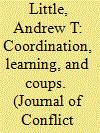

|
|
|
|
|
| Summary/Abstract |
This article proposes a theory of coups that centers around coordination and learning. The military is modeled as many officers who only want to join a coup if others join as well (i.e., coordination). If the current regime has survived past coup attempts, it is common knowledge that it is relatively strong (i.e., learning). Combining these effects, once the regime survives the first period, officers know that the regime is strong enough that they may refrain from staging a coup—regardless of how dissatisfied they may become with the status quo—under the mutually enforcing expectation that no other officer will rebel. The model has other equilibria where coup attempts can occur after the first period, allowing for more detailed empirical predictions. The analysis highlights several reasons why new regimes are prone to coups, but among regimes surviving the initial turmoil, structural factors that would seem to predict coup attempts can have an ambiguous effect. The model also makes novel predictions about how the “initial conditions” of a regime as well as what kinds of changes to payoffs affect the likelihood of coups.
|
|
|
|
|
|
|
|
|
|
|
|
|
|
|
|
| 7 |
ID:
147312
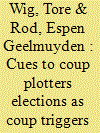

|
|
|
|
|
| Summary/Abstract |
A large proportion of coup attempts in autocracies occur in the aftermath of elections, yet little systematic research exists on the topic. Drawing on recent literature on elections in autocracies, we present an argument to explain postelection coups. While we recognize that electoral institutions have the potential to stabilize autocracies, we illustrate that the election event can spark instability when incumbents reveal electoral weakness. Electoral outcomes—in the form of vote shares and opposition reactions—are signals containing information about the strength of the opposition, and indirectly about the likelihood of a successful full-scale revolution that would compromise the privileged positions of regime elites. In these situations, coups are likely to be initiated to avoid a revolution, either by serving as concessions to the opposition or by facilitating increased repression. We perform a large-N study that supports our argument, significantly nuancing the claim that elections stabilize autocracies.
|
|
|
|
|
|
|
|
|
|
|
|
|
|
|
|
| 8 |
ID:
104041
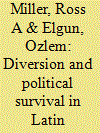

|
|
|
|
|
| Publication |
2011.
|
| Summary/Abstract |
In spite of its long history among scholars of international conflict, empirical evaluations of diversionary theory have produced contrasting-even contradictory- results. We offer three reasons for these differences: choice of unit of analysis; failure to model the reciprocal relationship between threats to the survival of political leaders on one hand, and international conflict participation on the other; and measurement error in operationalizations of the independent variable-the incentive of leaders to divert. We construct an empirical test that addresses all of these concerns. Our analysis of data from Latin America during the period 1960-99 reveals robust evidence in support of diversionary theory. The results also expose the biasing effects associated with the failure to control for reciprocal causation and measurement problems.
|
|
|
|
|
|
|
|
|
|
|
|
|
|
|
|
| 9 |
ID:
145986


|
|
|
|
|
| Summary/Abstract |
Military coups have posed a persistent threat to political stability in Africa, undermining democratization efforts, igniting insurgencies, and leading to years of devastating military governance. Initial cross-national studies found little consistent evidence linking ethnicity to coups, leading recent formal and statistical work on coup risk and coup-proofing to largely ignore ethnic politics. This article, however, argues that in two important contexts of African political development—decolonization and democratization—ethnic politics are critical to understanding the occurrence of coups. Both case study evidence and statistical analysis of original data on African military history and ethnic politics reveal that practices of ethnic manipulation within security institutions have driven coup attempts. When leaders attempt to build ethnic armies, or dismantle those created by their predecessors, they provoke violent resistance from military officers.
|
|
|
|
|
|
|
|
|
|
|
|
|
|
|
|
| 10 |
ID:
160784


|
|
|
|
|
| Summary/Abstract |
Signals from domestic and international actors have been shown to influence the likelihood of coups. Coups remain difficult to predict and consequently leave policy makers in a reactive stance, but little systematic work assesses how these reactions influence long-term outcomes. We examine how reactions from domestic and international actors influence the duration of coup-born regimes, arguing that negative reactions will shorten leadership duration. We further probe these relationships by considering how signaling consistency, Cold War dynamics, and precoup relationships condition the influence of reactions on leadership duration. Tests use events data to capture domestic and international reactions and newly coded information on leadership to capture leader duration. Results indicate that international responses have a profound influence on leadership tenure, especially those from strong actors. We find tentative support that state reactions have the strongest effect during the Cold War, while international organizations matter the most afterward.
|
|
|
|
|
|
|
|
|
|
|
|
|
|
|
|
| 11 |
ID:
155189
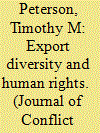

|
|
|
|
|
| Summary/Abstract |
In this article, I synthesize a number of recent studies exploring how exports affect human rights, highlighting a common implication that this relationship is conditional on how exports are associated with leaders’ relative costs of repression and accommodation. Beginning with this synthesis, I develop a theory demonstrating how the composition of exports affects human rights via its impact on leader expectations. More diverse exports promote continued growth and prosperity, provide leaders with greater resources, and suggest conditions less conducive to severe dissent, all of which reduce the relative costs of accommodation. Repression is likely to threaten the benefits otherwise associated with greater export diversity; thus its relative cost increases amid greater export diversity. I test this theory using commodity-level data from the United Nations Comtrade database to create a country-year-level measure of export diversity. Statistical analyses spanning 1981 to 2009 support my expectation. My results are robust to sample restrictions and the use of instrumental variables.
|
|
|
|
|
|
|
|
|
|
|
|
|
|
|
|
| 12 |
ID:
164170
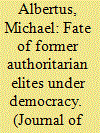

|
|
|
|
|
| Summary/Abstract |
Why do some former authoritarian elites return to power after democratization through reelection or reappointment to political office, or by assuming board positions in state-owned or major private enterprises, whereas others do not and still others face punishment? This article investigates this question using an original data set on constitutional origins and the fate of the upper echelon of outgoing authoritarian elites across Latin America from 1900 to 2015. I find that authoritarian elites from outgoing regimes that impose a holdover constitution that sticks through democratization are more likely to regain political or economic power—especially through national positions where the potential payoffs are largest—and less likely to face severe or nominal punishment. I also find a positive role for political capital among former elites. These results are robust to alternative explanations of authoritarian elites’ fate and using instrumental variables to address potential endogeneity. The findings have important implications for democratic consolidation and quality.
|
|
|
|
|
|
|
|
|
|
|
|
|
|
|
|
| 13 |
ID:
115010
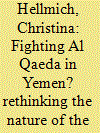

|
|
|
|
|
| Publication |
2012.
|
| Summary/Abstract |
This article evaluates U.S. perception of and response to Al Qaeda in the Arabian Peninsula (AQAP) operating in Yemen. It evaluates the empirical evidence on which the present understanding of the group is based, the implications of the sociopolitical context in which it operates, and the uneasy position of the Yemeni government in the War against Terror as it has been affected by U.S. policy from the early 1990s to the present. In the contested Yemeni state, AQAP is competing for political legitimacy and is increasingly dependent on public support. The U.S. kill-or-capture response, the "on-off" nature of its support that has made Yemen vulnerable to the influence of Al Qaeda in the past, and the actions of the Yemeni government itself, which depends on the continued existence of the threat to secure financial support vital for political survival, means that none of the measures being taken has the potential to defeat AQAP.
|
|
|
|
|
|
|
|
|
|
|
|
|
|
|
|
| 14 |
ID:
160788
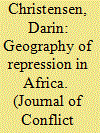

|
|
|
|
|
| Summary/Abstract |
I ask how the location of a protest affects how forcefully governments crack down. This geography of repression provides insight into a larger strategic problem: under what conditions do leaders meet protests with violence? I argue that protests in rural areas pose a smaller threat and, thus, prompt less frequent intervention. However, when governments decide to repress rural protests, they are less concerned that lethal repression might incite a backlash, as there are fewer bystanders in more rural areas that can join the fray. I uncover two patterns consistent with this theory: (1) repression is 30 percent more frequent in response to social conflicts in urban areas; but (2), if the state does employ repression, it is 75 percent more likely to kill dissidents in rural areas. The empirical relationships I report cannot be explained by reporting bias, international sanctioning, proximity to past armed conflicts, or the presence of natural resources.
|
|
|
|
|
|
|
|
|
|
|
|
|
|
|
|
| 15 |
ID:
165263
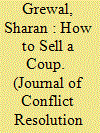

|
|
|
|
|
| Summary/Abstract |
Unlike other political leaders, leaders coming to power through military coups face a dual legitimation challenge: they must justify not only why they should rule but also how they came to power. Little attention has been paid to how coup leaders solve this legitimacy deficit and even less to the audiences of this legitimation. We ask: why do some coup leaders legitimate their coups by holding elections while others do not? Counterintuitively, we argue that coup leaders who oust democratically elected leaders are less likely to hold elections, except when tied to US military aid. We test these hypotheses through a data set of military coup regimes from 1946 to 2014 and trace out mechanisms through case studies of the Nigerian coup of 1983 and the Egyptian coup of 2013. This argument provides a new explanation for the emergence of authoritarian elections and a new perspective on the international dimensions of dictatorship.
|
|
|
|
|
|
|
|
|
|
|
|
|
|
|
|
| 16 |
ID:
190763
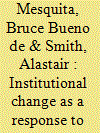

|
|
|
|
|
| Summary/Abstract |
Leaders shift political institutions to ameliorate threats to their tenure. The masses might rebel to replace the leader and change institutions. Disloyalty by political insiders might result in a coup. Leaders liberalize when the masses present a greater threat and ‘autocratize’ to dissipate threats from elites. A two-step procedure tests these arguments: (1) The risks of revolution and coup are estimated as a function of leader health, experience, economic conditions and extant institutions. (2) These risks are used to predict institutional change in a heteroskedastic regression model. The magnitude and direction of institutional change depends upon whether the masses or elites pose the greater threat. When both risks are high, leaders must gamble as to which risk they believe is greatest. In such circumstances, institutions are highly volatile even as the aggregate direction of change becomes unclear.
|
|
|
|
|
|
|
|
|
|
|
|
|
|
|
|
| 17 |
ID:
154737
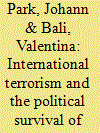

|
|
|
|
|
| Summary/Abstract |
This study examines whether transnational terrorist attacks impact the political survival of leaders. We argue that external security threats, such as those from transnational terrorist incidents, can undermine incumbent target governments by exposing foreign policy failures and damaging society’s general well-being. Yet, terrorism may not destabilize democratic governments as a result of citizens rallying around their elected leaders in threatening times. Focusing on Archigos’ survival leadership data and International Terrorism: Attributes of Terrorist Events’ terrorism data for the 1968–2004 period, we find that autocrats who experience higher instances of transnational terrorist attacks are more likely to exit power. Democrats, however, are relatively secure to the destabilizing influence of transnational terrorism.
|
|
|
|
|
|
|
|
|
|
|
|
|
|
|
|
| 18 |
ID:
138610
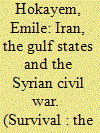

|
|
|
|
|
| Summary/Abstract |
An essential driver of the Syrian civil war has been the involvement of Iran, Saudi Arabia, Qatar and, to a lesser extent, the United Arab Emirates in every aspect of the struggle. Their role has influenced the calculations, positioning, behaviour and fortunes of the principal Syrian players. Irrespective of whether the effect was intended, this regional competition has revealed and deepened the many fault lines that cross Syrian politics and society. It has also exacerbated the polarisation of the Middle East.
|
|
|
|
|
|
|
|
|
|
|
|
|
|
|
|
| 19 |
ID:
138306


|
|
|
|
|
| Summary/Abstract |
How and why do regime type and interstate war affect government spending? We argue that a political leader allocates scarce resources between social and military expenditures as a function of their relative efficiency in securing her political survival. We derive four hypotheses concerning how mobilization for and demobilization from interstate war affects government spending differently in democratic and autocratic regimes. Compared to democracies, autocracies should increase military spending to a greater degree during wartime and decrease military spending to a greater extent following a war. Autocracies also should cut social spending more during an interstate war and increase social spending more during the process of demobilization from war than democracies. Our analyses of all states in the international system from 1950 to 2001 yield support for our hypotheses.
|
|
|
|
|
|
|
|
|
|
|
|
|
|
|
|
| 20 |
ID:
160489
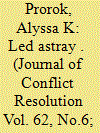

|
|
|
|
|
| Summary/Abstract |
This article examines the impact that rebel and state leaders have on civil war duration. It argues that leaders’ incentives to avoid punishment at the hands of internal audiences and opponents influence their strategic decision-making during war. Specifically, leaders who bear responsibility for involvement in the war have a higher expectation of punishment should they perform poorly, particularly for rebel and high-risk state leaders. As a result, these leaders have incentives to gamble for resurrection, extending ongoing wars in the hope of turning the tide and avoiding punishment. This suggests that civil wars are less likely to end when responsible leaders hold power, especially if the responsible leader is highly vulnerable to punishment. These propositions are tested using original data on all rebel and state leaders involved in civil conflicts between 1980 and 2011. Results support the hypothesized relationship between leader responsibility and war duration.
|
|
|
|
|
|
|
|
|
|
|
|
|
|
|
|
|
|
|
|
|